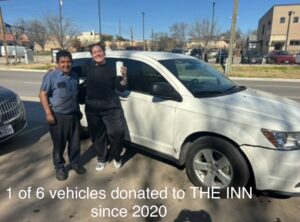
Rachael Vigil Hernandez is the founder of Las Chicas del Barrio and a Salvadoran American first-generation student born and raised in Oakcliff, Dallas, TX. After earning her BS from The University of Texas at Arlington she worked in accounting for 3+ years before working for her family business, VES Electric. She always felt the urge of doing more for the community and founded Las Chicas del Barrio in 2020. She has always had a desire to serve her community by providing tools and resources, establishing a platform to amplify Latinx voices, and by promoting inclusivity. She is currently on the path to pursue her MSW to be a mental health resource for her community. During her down time, she enjoys traveling with her husband and spending time with their two german shepherd puppies.
Did you deal with issues related to mental health growing up or know anyone in your community that had personal struggles?
We do talk a lot about the high suicide rates amongst Latina communities, but that is just a little bit of what we’re looking at. The organization was not necessarily based on me trying to take my own life, but it was just this feeling of frustration. I’m first-generation Salvadorian, so I felt that I had the encouragement in my family to go above and beyond to do something for myself. When it came to helping me, there was no support. Going to college and getting a job was very frustrating, but during the pandemic I began going to therapy and that’s when a lot of things started coming out personally. That’s where Las Chicas came to be because I understood if I’m going through this, I wonder how many other young women are experiencing the same thing. I started doing a lot of research and that’s where I found the alarming statistic that Latina teenagers were the highest demographic for suicide rates. Why are these suicide rates so high? What’s the common denominator in the studies that I investigated? A lot of it was the language barrier, cultural barrier, poor relationships with parents, lack of motivation, lack of support, and lack of mental health availability. When I say mental health, what comes to your mind? You might think of people who have intense issues, people who are crazy, or people who are on the verge of suicide. But the way I see it, is that mental health awareness is trying to nip something in the bud or try to help someone at the beginning instead of waiting until someone is trying to take their life.
My organization doesn’t strictly address high suicide rates because we’re not therapists or in the mental health field. We are working on different partnerships with mental health facilities, that way they can provide therapy for our girls. What we do is provide one-on-one mentorship for high school students in the Dallas-Fort Worth area. We launched our program this past October with 30 students, so each student has a mentor that they work with. On top of that, we do take a holistic approach, so we do focus on education and getting them into college. We look at financial literacy, mental health awareness, health and wellness, and community outreach. We believe that a lot of students sometimes are pushed to go to college, but we don’t really look at what’s going on at home. Does the teenager really want to go to college? One thing we tell our students is they don’t need to go to school to be successful and a college degree does not equal success. Personally, I did go to college, but I never worked in what I went to school for. I got my bachelor’s in sociology, then I ended up working in accounting. I think a lot of that goes back to a lack of guidance and mentorship. No one told me it was going to be hard to get a job in sociology. Now, instead of normalizing young women going through the same things that I went through, I want to make a difference. Thankfully, our mentors have gone through other situations as well. But they have the same heart in making a difference in our community.
How involved are the families in these mentorship programs?
Due to the mentees being minors, their parents have been involved. We did have consent forms and parent info sessions. We helped them in English and Spanish, that way we could make sure that their parents understood everything that we were saying. I don’t want to say that there’s a lack of interest from the parents, but I think there’s just a little bit of resistance. I think part of it can come from fear. They never had their child in an organization like this. It’s hard to earn their trust as well. I personally have two mentees, one that I worked with last year and one that I have this year. A big part of this experience has been connecting with the mother. I’ve made sure for that connection to be my biggest priority because the moment I connect with the mother, then I establish that trust with her. And I’ve noticed that then my relationship with the mentee changes on a larger scale. I try to make sure to also let the parents know we are here to help you and we’re not here as a threat. In the Latino community, when someone else comes in to try to tell their children how to do something, it’s seen as a threat. We want to make sure that they understand we’re here to help them. If they have a concern about their child, they can reach out to us. Thankfully, a lot of our mentors have been able to establish a relationship with parents. We are trying to find ways to involve parents even more.
You sometimes hear immigrant parents deal with the struggles of assimilation and maintaining cultural roots. Was this something you noticed when bringing up certain topics to the families of mentees?
I think that’s still a very big challenge and I’ve experienced that with my parents. I even think about it for my future children, like how am I going to have those conversations with them? Because we have a few people on our team that were taught to assimilate so much that they lost a lot of their culture. Now they’re older, they’re trying to go back to it. We’re seeing both ends of the spectrum because then we have some that are so afraid of having their children assimilate because they’re afraid of losing their culture. There’s an emphasis on education not being there and religious traditions are also a part of it. Now with the parents, we haven’t received a lot of pushback. I feel like the parents have been very open, but I think a lot of it comes with us also explaining in detail to the parents what we’re going to be doing. We make sure that we tell them these are our areas of focus, these are our pillars, and our workshops will be focused on these things. I think that the parents that we have are open-minded and we have some parents that have signed up their students. I think the more that they learn about what we’re doing, then they’re more interested in these topics and about allowing their child to grow for sure.
Your organization has four pillars of health and wellness education, financial literacy, education, and community outreach. Have any of these pillars gotten better or worse since you were a child?
I don’t know if necessarily any of them have gotten worse or better, but I think that there’s been more awareness specifically with mental health and financial literacy. When I was growing up, we did not discuss mental health. It wasn’t even a term that I knew until I was older. Going to therapy was something that I would’ve never imagined, and I feel that our mentees right now have parents who are more open to it. They’re used to hearing the term mental health even in Spanish and our getting used to hearing words like anxiety, stress, social anxiety, and just accepting these terms versus pushing them away. I wouldn’t say it’s getting better necessarily because I feel like the lack of accessibility to therapy for the Latino community is still extremely low. But I will say that the awareness is a little bit higher and I have hope that will help with the mental health. With financial literacy, I’m noticing that the problems that I had, is still what’s going on right now. Now I will say I’ve noticed that our mentees ask questions that I would’ve never asked in their age. A lot of them are very interested in what is credit. How is it made up and what can they do to start setting themselves up for success? When I was their age, I could care less about that. I think a big part of it might be social media. A lot of people talk about it on Instagram, so I think that they do have more resources and that’s where those questions are coming from.
Are there any key differences dealing with a 15-year-old mentee and a 25-year-old mentee?
It was shocking that I noticed there was a slight difference between the age groups. We had a financial literacy workshop in November and the guest speaker that we had stated “that was the most interactive audience that I have ever had.” She asked me “what were the ages of the students who were asking all of these complex questions?” I told her those were our youngest mentees, consisting primarily of freshman and sophomore students from local high schools. It’s not that big of a difference. They do have a little bit of a difference, like the older mentees ask a lot of questions about buying a home and saving for a home because they do have different needs compared to the younger ones. It still goes back to the basics like what is credit and what budget system should I use? Even in mental health, I did notice that it’s pretty much the same across the board. One of the things that we do before every workshop is, we ask our mentees to use two words to describe what their week feels like, and then we don’t pry into it. We tell them we just want to know where you’re at. Sometimes the mentors also answer these questions and it’s been the same pretty much. They mention being anxious, overwhelmed, stressed, burnt out, and tired. But we’re seeing the same thing with the older ones, with the mentors, with the older mentees, and then also with the younger ones, so not that big of a difference.
Has your organization ever touched up on MLMs within the Hispanic community?
We haven’t touched that, but it’s one of the topics that I want to do. We’re planning on doing something around career and jobs, and that’s where I want to bring that in because that is something that I’ve noticed. When I was younger, I had a lot of people reach out to me stating “let’s start your own business.” But that’s not having your own business. You technically are still working for someone and you’re making money for someone else. I want to make sure that we educate our girls on that because a lot of them, when they’re out of high school, they’re so ready to do something big with their lives. And if someone tells them there’s an easy way to make money and to be your own boss, they’re going to take it. One of the things that we’re doing to counter-set that is also doing entrepreneur education workshops. We want to make sure that our girls know starting your own business is an option, but you need to do it the right way. You must file the correct paperwork and have a business bank account. If you’re going to sell something, make sure that you’re going to pay sales taxes on these things. We want to do these things with them. It’s something we’re also working with our mentors on because a lot of our mentors have small businesses. A lot of them have expressed like “Hey, I don’t even know how to do bookkeeping for my business, I just run all of my finances together.” I think it’s just something that the Latino community in general needs, so we are hoping to provide a lot more workshops around that. It’s interesting that you brought that up because it’s something that is always on my mind and see in my everyday life. One time I overheard this young girl and she was just calling all of these people like “Hey, I just want to make sure that you’re going to be on the call tonight, you know, it is going to be life-changing.” I could just see her passion, but then the more I heard her talk about it, I noticed it was an MLM.
Are there any upcoming projects you’re excited about for Las Chicas?
This was our first year, so one of the things that we struggled with is that we had a very small board. Our board is now almost finally complete. One of the things we did was strategic planning. Now we’re able to see what we envision for Las Chicas and really start to break it down. One of the things that I’m super excited about is hopefully being able to offer therapy to our girls. Therapy is expensive, sometimes it’s not accessible. I want to make sure that we can find therapists who look like them, who’ve gone through similar situations, and who can understand what they’re going through. Another thing is we are establishing more relationships with schools because I feel like the teachers really understand which students are the ones who could benefit from this program. A few of the workshops that we’re wanting to do are therapy, gardening for therapy, and photography therapy. We want to show our girls how to do a lot of hands-on things. Whether it’s doing flower arrangements, gardening, going out and taking pictures, but different ways to relieve that stress. We want to work on meditation, but just giving them these tools to be able to do these things for themselves. So those are a few of the workshops I’m excited for. We are hoping to launch our first conference in August and doing like a weekend event where we bring in special guest speakers to talk about things like finances and careers. Helping them either build a resume or just prep them for college or complete little steps to start their own business. We want to offer a lot of just hands-on activities versus just here’s an email with steps, so just really making sure that they follow through with those things.

